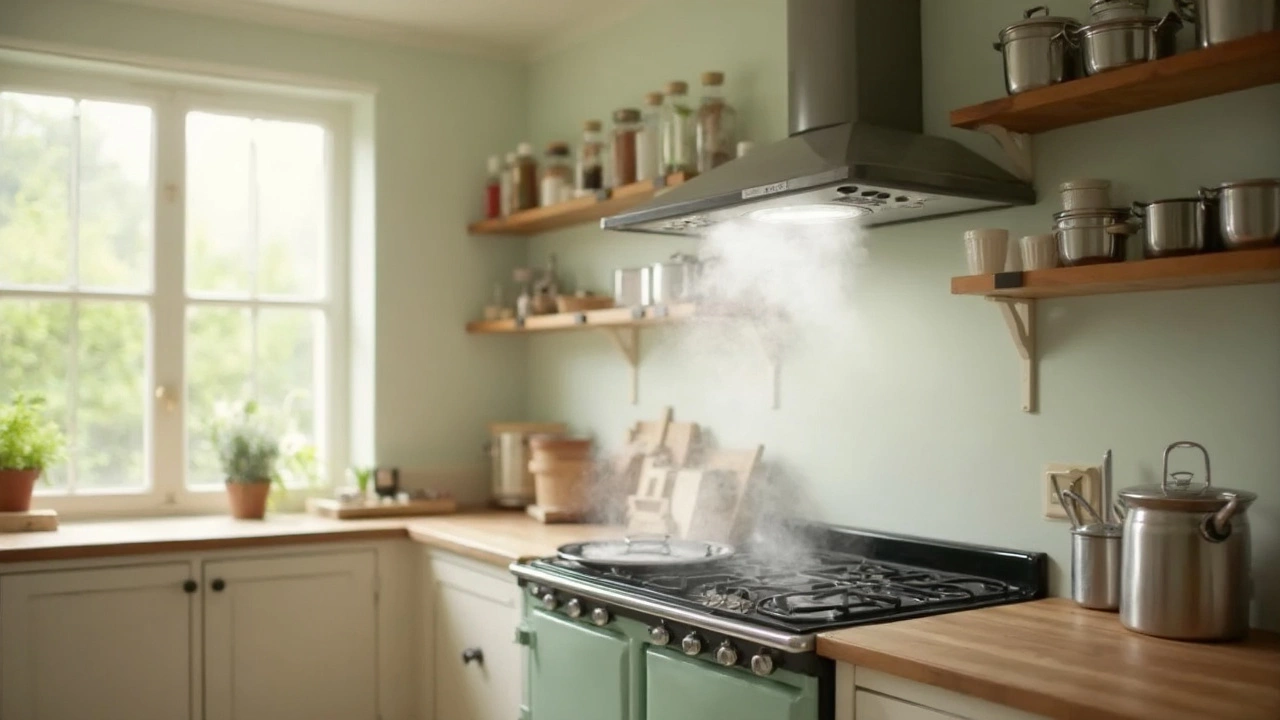So, what really happens if you skip turning on the extractor fan in your home? I know it can feel like an extra chore, but this little appliance is a real hero in the kitchen and bathroom! First things first, without it, those steamy showers and sizzling fry-ups can turn your home into a virtual sauna. Excess moisture leads to damp surfaces, inviting mold and mildew to settle down. We don’t want that, right?
There's also the not-so-pleasant issue of lingering odors. Ever walked into a house hours after dinner's been cooked, only to be hit with the lingering smell of fried fish? Yeah, unpleasant. Extractor fans help whoosh those smells away before they can cling to furniture or curtains.
Humidity and Moisture Build-Up
Alright, let's get into the thick of it—humidity and moisture. When you don't use an extractor fan, all that steam from your bubble baths and cooking adventures doesn't just disappear; it hangs around. This excess moisture can lead to a whole bunch of problems. Ever notice paint peeling or walls feeling a bit sticky? That's likely due to moisture build-up.
Without proper kitchen ventilation, these subtle changes can become major headaches. Moisture can seep into the walls and ceilings, leading to structural damage over time. Not something you want, right? Plus, this damp environment is a breeding ground for mold and mildew. These buggers can spread quickly and are pretty tough to kick out once they settle in.
How It Affects Your Home
If you're thinking, "Well, a little moisture never hurt nobody," think again. The damage doesn't stop at just aesthetics. We’re talking potential issues like respiratory problems if mold gets a hold of your home, and let's face it, no one enjoys the smell or health issues associated with that.
Keeping Moisture in Check
- Use that extractor fan when you're cooking or taking a shower. It's there for a reason!
- Consider installing a humidity sensor if your fan doesn't have one. These gadgets can automatically turn the fan on when moisture levels are high.
- A quick wipe down of damp surfaces reduces long-term moisture build-up.
It's all about keeping that moisture at bay. With a little effort and the help of an extractor fan, you can protect your home from unwanted humidity dramas.
Odor Problems
Ever cooked bacon for breakfast and then had to live with the smell until dinner time? That’s because without an extractor fan, kitchen smells can linger long after the food’s been eaten. As much as we love the aroma of freshly brewed coffee or a simmering tomato sauce, these can turn your cozy home into a medley of unintended scents.
The real issue isn't just about unpleasant odors overstaying their welcome. These smells can actually cling to your household surfaces—the curtains, cushions, and yes, even your clothes. The fabric absorbs these odors, and unless aired out, it can seem like you're constantly living in a kitchen.
How Odor Affects Air Quality
Beyond the annoyance of living with a mishmash of smells, there's a deeper problem. Odors can impact the air quality in your home. Did you know that cooking, especially frying, releases volatile organic compounds (VOCs) into the air? These are tiny particles that can affect indoor air quality and sometimes even pose health risks if you're constantly exposed.
Managing Indoor Odors
Here’s where the trusty extractor fan comes into play. By venting out these odorous particles and fumes, you're essentially keeping your home’s atmosphere cleaner and fresher. If the fan is not enough or you don’t have one yet, here are a few tips to help manage those kitchen odors:
- Open a Window: It's the simplest solution. Sometimes, simply allowing a cross breeze can carry out those unwelcome smells.
- Use Natural Deodorizers: A bowl of vinegar or baking soda placed near the stove can absorb odors.
- Cook with a Lid On: Keeping a lid on the pots can prevent smells from escaping, and having the fan on while you do it is even better!
Investing in a good quality extractor fan and using it diligently isn't just about keeping smells at bay; it's a step towards a healthier home.

Impact on Air Quality
Ever wonder why the air in your home feels a bit stuffy even when the windows are shut tight? Not using an extractor fan could be one of the culprits! Proper ventilation is crucial for maintaining good air quality, but without it, pollutants and moisture can linger in the air, creating a stuffy and potentially unhealthy environment.
Your kitchen, for instance, is not just about delightful smells. Cooking releases smoke, grease, and other particles into the air. Now, without an effective extractor fan, these particles can settle on surfaces and over time, degrade the air you breathe in. It's not just about comfort — you could be inhaling things your lungs would rather do without.
Health Implications
Breathing in stale air isn't just a minor inconvenience; in some cases, it might impact your health. Poor indoor air quality can be linked to respiratory problems or aggravated allergies, which are definitely things you want to avoid, right? By using an extractor fan, you not only eliminate stale air but also refresh the atmosphere, making it much healthier.
Maintaining Indoor Air Balance
Extractor fans are key to maintaining a balance between indoor and outdoor air quality. Especially in urban areas like Auckland, where outside air might already be a bit polluted, ensuring that your inside air is as clean as possible becomes all the more important. So, rev up that extractor and give your lungs a break!
| Pollutant | Source | Impact |
|---|---|---|
| Smoke | Cooking | Respiratory problems |
| Moisture | Showering | Mold growth |
| Grease | Frying | Surface build-up |
Maintenance and Efficiency Tips
Keeping your extractor fan in top shape doesn’t have to be a hassle. With some regular upkeep, you can make sure it works efficiently every time you need it. Let’s dive into some practical tips to keep it running smoothly.
Regular Cleaning
It might not be glamorous, but cleaning is key. Dust and grease can clog the fan, reducing its ability to ventilate properly. Aim to clean the fan every three months. Here’s how:
- Turn off the power to the fan for safety first.
- Remove the fan cover and wash it with warm, soapy water.
- Wipe down fan blades and components with a damp cloth.
- Let everything dry completely before reassembling.
Filter Replacement
Fans with filters need regular filter changes. Baking and frying create stubborn grease residues, so replace your filter every 6 months, or toss it in with your regular deep-cleaning routine. Some filters are disposable, while others can be washed and reused.
Check for Obstructions
Once in a while, take a peek outside where your fan vents. Make sure nothing’s blocking the airflow like a nest or debris. A quick check can make a huge difference in how well your fan operates.
Pro Tip for Efficiency
Here’s a cool hack: Run the fan for 10-15 minutes after cooking or showering to help clear remaining moisture and odors. It helps keep the air fresher, longer!
Cost of Neglect
Neglecting these simple maintenance tasks can hit your wallet. A clogged fan uses more energy, driving up those utility bills. And if moisture wreaks havoc with mold and mildew, repairs can be costly. So a little maintenance goes a long way!
Keeping your kitchen ventilation in working order isn’t just about avoiding problems—it’s about ensuring a healthier home environment. Now you’re armed with the knowledge to keep that trusty fan in peak condition.


